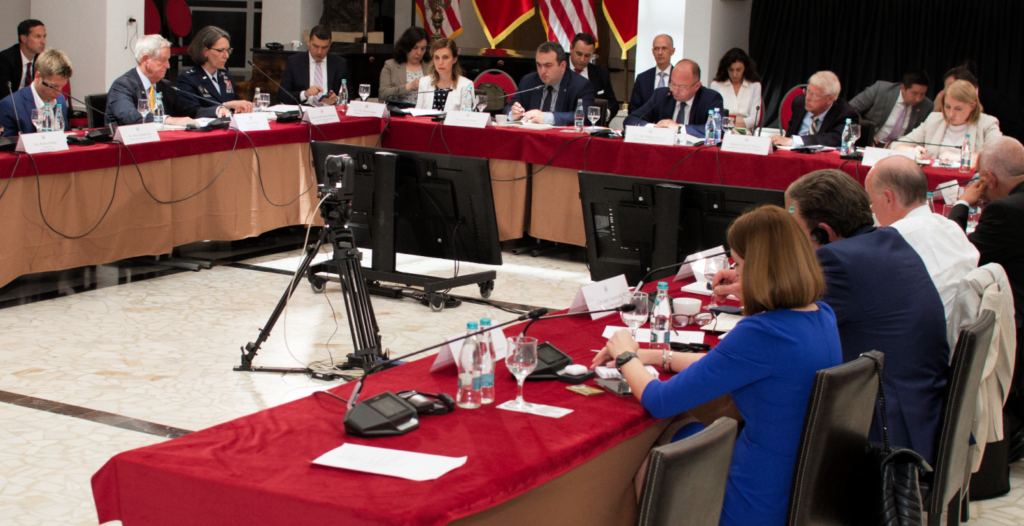International Organizations

Hearing: Has the United Nations Failed Ukraine and t...
Sep 27, 2023Wednesday, September 27, 2023 2:00 pm to 3:30 p.m. Rayburn House Office Building Room 2200 Stream live here: https://www.youtube.com/watch?v=RrBXYsQA0Qk In 2022, Russia launched a full-scale invasion of Ukraine and the […]

Has the UN failed Ukraine and the World?
Sep 23, 2023Many leaders and experts argue that the United Nations has struggled to uphold Article I of the UN Charter which mandates the UN to “take effective collective measures for […]

United States Demonstrates Global Leadership on Ukra...
Jul 14, 2023The Helsinki Commission’s four senior leaders helmed the United States’ bicameral, bipartisan delegation to the 30th Annual Session of the OSCE Parliamentary Assembly last week in Vancouver, Canada. Co-Chairman Senator […]
Helsinki Commission Chair and Co-Chair Lead Delegati...
Jul 10, 2023WASHINGTON—Helsinki Commission Co-Chair Senator Ben Cardin (MD) and Helsinki Commission Chair Representative Joe Wilson (SC-02) led a bipartisan Congressional delegation to the 30th Annual Session of the OSCE Parliamentary Assembly (OSCE […]
Helsinki Commissioners Lead Call for “Clear an...
Jun 21, 2023WASHINGTON—Last week, members of the Commission on Security and Cooperation in Europe, Chairman Representative Joe Wilson (SC-02), Ranking Member Representative Steve Cohen (TN-09), Commissioners Sen. Richard Blumenthal (CT), Sen. Sheldon […]
HEARING: NORTH MACEDONIA’S LEADERSHIP OF THE OSCE IN...
Feb 24, 2023Tuesday, February 28, 2023 1:00 p.m. to 2:00 p.m. Streaming: https://www.youtube.com/watch?v=xNgAOyC9f5g North Macedonia has taken up leadership of the world’s largest regional security organization—the Organization for Security and Cooperation in Europe […]
Steadfast Support for Ukraine: United States Delegat...
Feb 23, 2023WASHINGTON – Today, the United States Delegation to the Parliamentary Assembly of the Organization for Security and Cooperation in Europe (OSCE PA), led by Senator Ben Cardin (MD), met with […]
No Safe Haven: Launching the US-Europe Coalition on ...
Dec 13, 2022Since February 24, 2022, Western countries have imposed sanctions against Russian officials, businessmen, and public figures who support Russian aggression against Ukraine by financial or political means. Personal sanctions have […]
Helsinki Commission Delegation Convenes Historic Bla...
Jul 14, 2022WASHINGTON—From June 29 – July 9, Helsinki Commission Ranking Member Sen. Roger Wicker (MS) led a bipartisan, bicameral congressional delegation to Romania, the United Kingdom, Finland, and Sweden to consult […]

Black Sea Security Summit
Jul 01, 2022A Roundtable Dialogue Hosted by the Commission on Security and Cooperation in Europe On the heels of the 2022 NATO Summit in Madrid, on July 1 the Commission on Security […]
Helsinki Commission to Convene Black Sea Security Su...
Jun 27, 2022WASHINGTON—On the heels of the 2022 NATO Summit in Madrid, on July 1 the Commission on Security and Cooperation in Europe, also known as the Helsinki Commission, will convene its […]
Helsinki Commission Applauds European Commission Rec...
Jun 22, 2022WASHINGTON—Following the European Commission’s recommendation that Ukraine and Moldova be granted EU candidate status, Helsinki Commission Chairman Sen. Ben Cardin (MD), Co-Chairman Rep. Steve Cohen (TN-09), and Ranking Members Sen. […]
